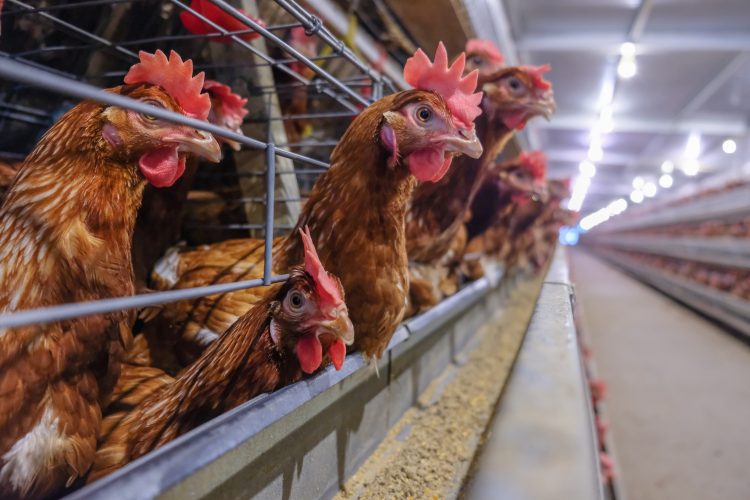Bad apples? With animal cruelty, the whole orchard is rotten
- Like
- Digg
- Del
- Tumblr
- VKontakte
- Buffer
- Love This
- Odnoklassniki
- Meneame
- Blogger
- Amazon
- Yahoo Mail
- Gmail
- AOL
- Newsvine
- HackerNews
- Evernote
- MySpace
- Mail.ru
- Viadeo
- Line
- Comments
- Yummly
- SMS
- Viber
- Telegram
- Subscribe
- Skype
- Facebook Messenger
- Kakao
- LiveJournal
- Yammer
- Edgar
- Fintel
- Mix
- Instapaper
- Copy Link
Posted: 1 August 2023 | Sean Gifford | No comments yet
Sean Gifford, Managing Director of The Humane League UK discusses why he thinks animal cruelty is an ongoing problem in the UK food industry and why a “strong movement” is necessary.


By Sean Gifford
I believe the majority of people wish animals to be treated with kindness and respect. Yet unfortunately, our good intentions fall far short in practice. In fact, our relationship with animals is among the most disgraceful in modern society.
Over 90 percent of chickens raised for meat in the UK are fast-growing ‘frankenchickens’, selectively bred to grow unnaturally large, unnaturally fast, and crammed into densely crowded sheds. That’s over one billion individual thinking, feeling animals every year. Their unnatural fast growth (growing from birth to slaughter weight in just 35 days) inflicts them with a slew of extreme health problems like organ failure, lameness, bone deformities, ammonia burns, muscle diseases and premature death.
The scale of the suffering is staggering. I’ve seen how chickens raised for meat are kept – a sea of suffering birds, tens of thousands in a single barn, their white feathers stained brown or burned off by their own manure. If you arranged these one billion frankenchickens in a line it would go around the planet 12 times.
Who is responsible for this cruelty? Part of the answer must be supermarkets, where The Humane League UK estimates well over half of the UK’s chicken is sold. Yet is it the supermarkets themselves who bear the blame, or their suppliers? Or is it farmers? Or even individual workers?
Frankenchickens have suffering coded into their DNA. Their lives are predetermined to be dreadful, well before the intervention of any worker or farmer. While it might therefore look like the suppliers bear responsibility, who procure the birds, raise them and send them off to slaughter and sale, it’s not entirely accurate to say the buck stops with them. When it comes to bucks, it’s supermarkets who possess them in spades, and supermarkets who set the agenda.
Leading chicken suppliers have been completely transparent about the fact that their choices are dictated by demand. Last year, major chicken supplier 2 Sisters Food Group accommodated M&S’s transition to the Better Chicken Commitment (BCC), an animal welfare policy which gets rid of fast-growing breeds, giving the animals more space, more light and less painful slaughter methods. Then 2 Sisters Food Group also announced that they now stock 20 percent of their total flock to BCC standards. In other words, suppliers will do what they are asked. It is supermarkets who are requesting frankenchickens, and supermarkets with the power to challenge cruelty by adopting the BCC.
This is not to say suppliers do not matter. The people who directly supervise animals have an obligation not to be deliberately cruel. In cases of viciousness or negligence, such as seen in investigations into Lidl suppliers in the UK and Austria, where chickens were crushed to death with vehicles, no excuses should be made whatsoever. Yet supermarkets are often the first to cut ties with their suppliers, blame workers and wash their hands of such incidents.
In response a spokesperson from Lidl GB told New Food: “We work closely with our suppliers and industry partners and have long-term partnerships, including sitting on the poultry board of Red Tractor, to ensure that we are continually improving animal welfare standards, whilst also responding to what our customers want and expect from us.
We are proud that in 2019, we became the first retailer to introduce method of production labelling across our fresh poultry range. The transparent label outlines the environment in which the animal was reared, and we are committed to increasing the number of products from higher welfare production systems over the coming years.
We remain the only supermarket in the UK to have ‘Welfare Windows’ on pack. Last year we extended the scheme across more products and actively market this initiative to customers, supporting more informed purchasing decisions. All fresh chicken supplied to Lidl complies with nationally recognised third-party standards, including Red Tractor Assured, RSPCA certification and Soil Association Organic. Additionally, our free-range RSPCA Assured chicken meets and exceeds the requirements of the Better Chicken Commitment.”
It should not be so easy for supermarkets to shirk the blame. Incidents of animal cruelty are not isolated flare-ups of malice, but exist in a context where animals are assigned no worth at all beyond what their dead bodies can fetch in the supermarket aisle. Cruelty in farming isn’t caused by a few bad apples: the whole orchard is rotten.
Supermarkets are at the helm of this callous system, holding all of the power necessary to change it while jealously guarding their bank accounts. It’s not just supermarkets’ relationship with suppliers that’s broken – it’s with the natural world; with animals; with the general public and their values.
If we are to live up to the label of “a nation of animal lovers”, we need to fundamentally change how animals are mistreated in farming. That means recognising that farmed animals are sensitive beings who can feel joy as much as they can feel pain, and whose suffering matters. What they face in factory farm sheds and abattoirs goes far beyond discomfort and inconvenience; it is outright cruelty and violence.
To oppose this we need a strong movement, united around a firm belief that animals deserve better. But to enact change, pressure must come onto supermarkets to stop selling suffering. They can change the system from one driven by profit, to one with animal welfare at its heart. If supermarkets reform their animal welfare then the dominos propping up cruelty may begin to fall; so long as animal activists and their supporters are there to push them.
The above article reflects the views of the author and does not reflect those of New Food.
About the author:


Related topics
Quality analysis & quality control (QA/QC), Research & development, retail, Supermarket, Supply chain, Trade & Economy









